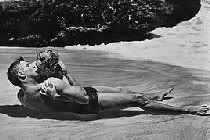A few months ago, I posted about how I didn't understand why critics rate Alfred Hitchcock's Vertigo so highly. There's a lot good to be said about Hitchcock, but the AFI, when they ranked the 100 greatest American movies last year, put Vertigo at #9, which I don't understand at all. I wouldn't put Vertigo much higher than #9 amongst Hitchcock's own movies, let alone the greatest movies of all time. I bring this up only because TCM is airing a movie that would be near the top of my list, but which was inexplicably snubbed by the AFI last year: From Here to Eternity, May 7 at 8:00 PM ET. From Here to Eternity is famous for the iconic -- and often parodied -- scene of Burt Lancaster and Deborah Kerr making out on the beach, but there's so much more to it than that. Sure, Lancaster and Kerr are both excellent: he as the enlisted man who just can't bring himself to become an officer, and she as the officer's wife who's been abandonded emotionally by her husband, and decides to respond by sleeping around. Each could be the subject for a full-length post themselves. For me, though, the revelation of the movie is Montgomery Clift.
From Here to Eternity is famous for the iconic -- and often parodied -- scene of Burt Lancaster and Deborah Kerr making out on the beach, but there's so much more to it than that. Sure, Lancaster and Kerr are both excellent: he as the enlisted man who just can't bring himself to become an officer, and she as the officer's wife who's been abandonded emotionally by her husband, and decides to respond by sleeping around. Each could be the subject for a full-length post themselves. For me, though, the revelation of the movie is Montgomery Clift. Sure, Clift is famous enough as it is. To be honest, though, I'm not that big a fan of his work. A Place in the Sun is an excellent movie, but for me, it's Shelley Winters who drives that whole movie; once her character dies, the movie really begins to bog down. Clift is serviceable in leads like The Big Lift, but also had the misfortune of being stuck in messes like Raintree County. However, it is here in From Here to Eternity that Clift shows just how good an actor he could be. Clift plays Army Pvt. Robert E. Lee Pruitt, who seems to be a bit of an aimless man who doesn't have any idea where he wants to go, or what he wants out of life. He transfers from one company to another because they made somebody else the top bugler, and refuses to box any longer after having blinded a sparring partner. Pruitt has a deep vein of anger running through him, which is unfortunately not a good thing for an enlisted man in the army to have, being expected simply to follow orders. Indeed, this vein of anger gets him into all sorts of trouble, not least because his new company commander is desperate to have him box in the regimental championships: Pruitt's refusal subjects him to all sorts of discipline.
Sure, Clift is famous enough as it is. To be honest, though, I'm not that big a fan of his work. A Place in the Sun is an excellent movie, but for me, it's Shelley Winters who drives that whole movie; once her character dies, the movie really begins to bog down. Clift is serviceable in leads like The Big Lift, but also had the misfortune of being stuck in messes like Raintree County. However, it is here in From Here to Eternity that Clift shows just how good an actor he could be. Clift plays Army Pvt. Robert E. Lee Pruitt, who seems to be a bit of an aimless man who doesn't have any idea where he wants to go, or what he wants out of life. He transfers from one company to another because they made somebody else the top bugler, and refuses to box any longer after having blinded a sparring partner. Pruitt has a deep vein of anger running through him, which is unfortunately not a good thing for an enlisted man in the army to have, being expected simply to follow orders. Indeed, this vein of anger gets him into all sorts of trouble, not least because his new company commander is desperate to have him box in the regimental championships: Pruitt's refusal subjects him to all sorts of discipline.
But there's also his frienship with another kindred, put-upon soul, that of Frank Sinatra's Pvt. Maggio, who is constantly harrassed for little more than being of Italian descent. Pruitt's and Maggio's mutual loyalty eventually gets both of them into legal, and physical danger. There's also Pruitt's relationship with Lorene, who is little more than an emotional hooker at a gentleman's club: she's employed to provide frienship, but no real physical intimacy or any other form of sexual excitement. (Indeed, the lack of intimacy is highlight by the fact that Lorene isn't her real name, but one that her boss selected because it sounded more classy.) She's played by Donna Reed, definitely cast against type. She's one of the few people who comes close to understanding Pruitt's rage, but even she can't quite get it, which only seems to make Pruitt even more frustrated.
Elizabeth Taylor, who starred with Clift in the aforementioned A Place in the Sun and Raintree County, intimates in a piece that airs regularly on TCM that Clift was deeply troubled off the screen; perhaps even more so than anything we're led to believe about him from the normal biographies. One only wonders which of all his troubles Clift was drawing on at various points of the movie.
With all these outstanding performances, what is it that the critics of today don't like about From Here to Eternity?
Bud Ralston
14 hours ago

No comments:
Post a Comment